Unit 2 How often do you exercise? sectionB 3a-selfcheck课件(共14张PPT)
文档属性
| 名称 | Unit 2 How often do you exercise? sectionB 3a-selfcheck课件(共14张PPT) | 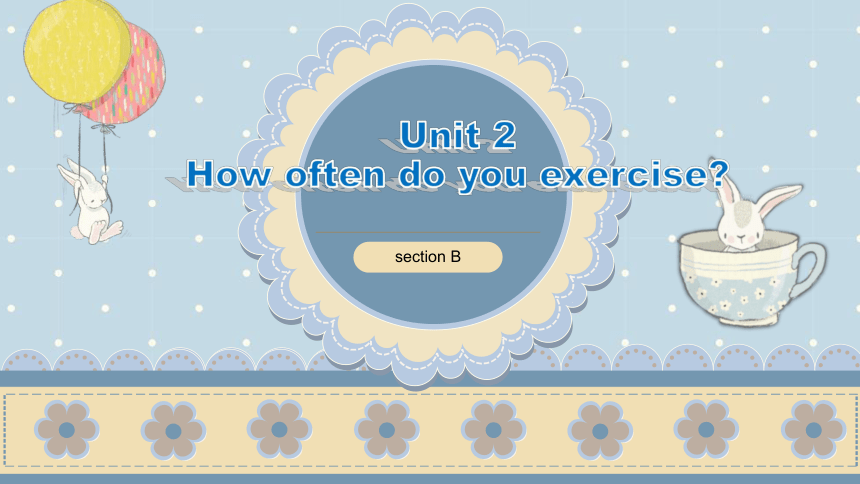 | |
| 格式 | pptx | ||
| 文件大小 | 1.7MB | ||
| 资源类型 | 试卷 | ||
| 版本资源 | 人教新目标(Go for it)版 | ||
| 科目 | 英语 | ||
| 更新时间 | 2021-12-07 14:09:52 | ||
图片预览

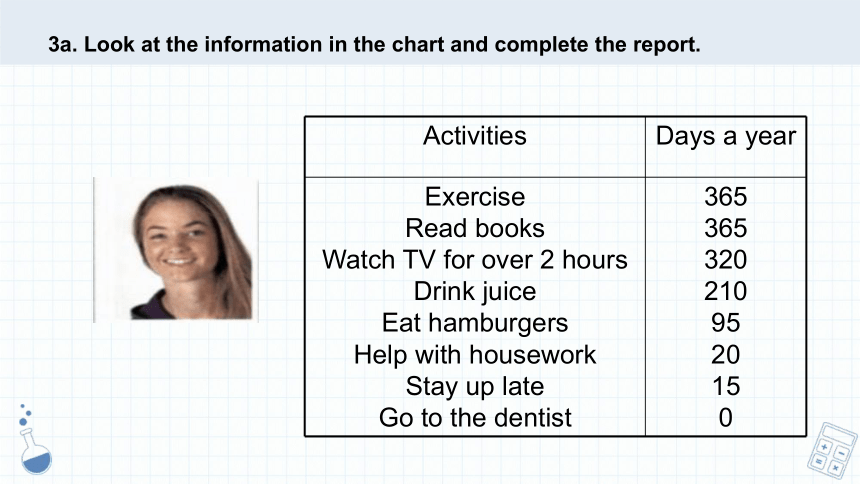
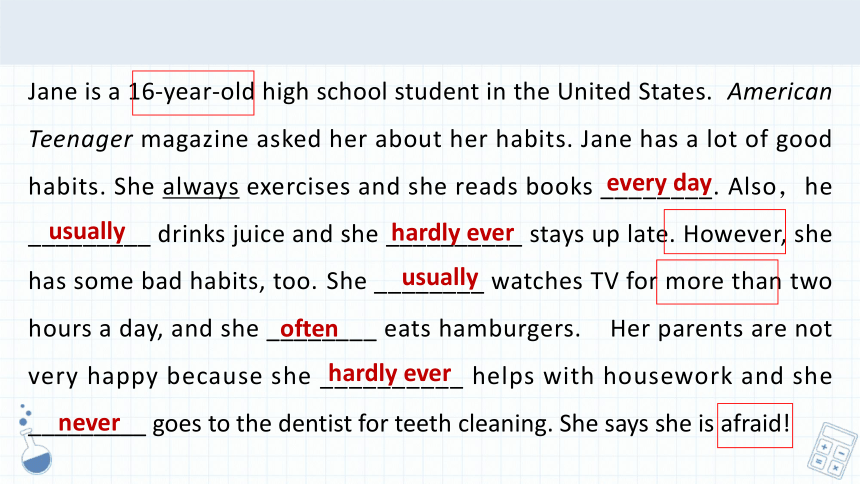
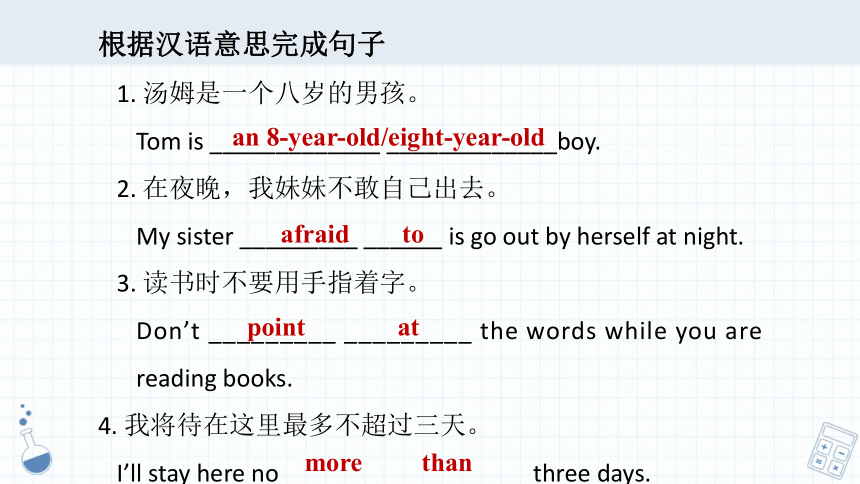
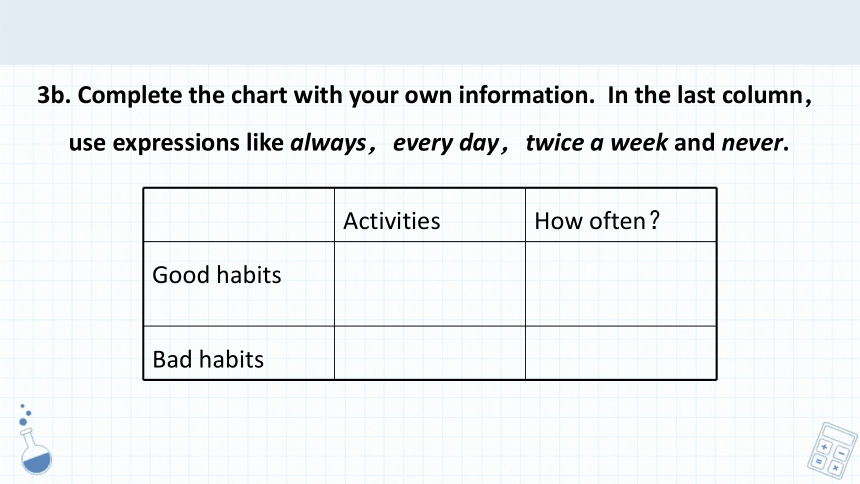
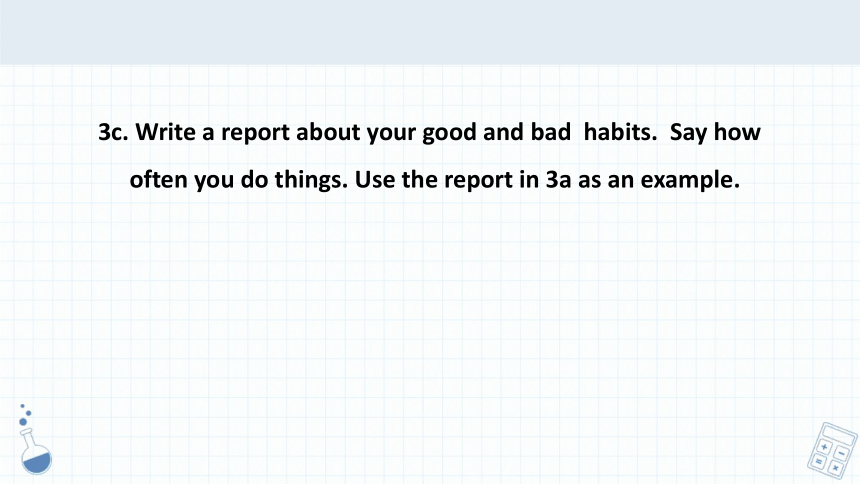
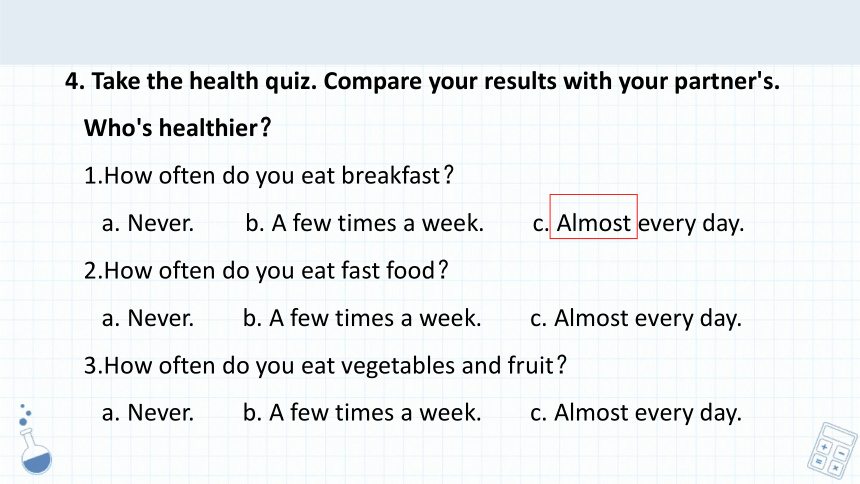
文档简介
(共14张PPT)
Unit 2
How often do you exercise
section B
3a. Look at the information in the chart and complete the report.
Activities Days a year
Exercise Read books Watch TV for over 2 hours Drink juice Eat hamburgers Help with housework Stay up late Go to the dentist 365
365
320
210
95
20
15
0
Jane is a 16 year old high school student in the United States. American Teenager magazine asked her about her habits. Jane has a lot of good habits. She always exercises and she reads books ________. Also,he _________ drinks juice and she __________ stays up late. However, she has some bad habits, too. She ________ watches TV for more than two hours a day, and she ________ eats hamburgers. Her parents are not very happy because she __________ helps with housework and she _________ goes to the dentist for teeth cleaning. She says she is afraid!
every day
usually
hardly ever
usually
often
hardly ever
never
根据汉语意思完成句子
1. 汤姆是一个八岁的男孩。
Tom is _____________ _____________boy.
2. 在夜晚,我妹妹不敢自己出去。
My sister _________ ______ is go out by herself at night.
3. 读书时不要用手指着字。
Don’t _________ _________ the words while you are reading books.
4. 我将待在这里最多不超过三天。
I’ll stay here no _________ _________ three days.
an 8-year-old/eight-year-old
afraid to
point at
more than
plete the chart with your own information. In the last column,use expressions like always,every day,twice a week and never.
Activities How often?
Good habits
Bad habits
3c. Write a report about your good and bad habits. Say how often you do things. Use the report in 3a as an example.
4. Take the health pare your results with your partner's. Who's healthier?
1.How often do you eat breakfast?
a. Never. b. A few times a week. c. Almost every day.
2.How often do you eat fast food?
a. Never. b. A few times a week. c. Almost every day.
3.How often do you eat vegetables and fruit?
a. Never. b. A few times a week. c. Almost every day.
4.How often do you exercise?
a. A few times a year. b. A few times a month.
c. A few times a week.
5.How many hours do you watch TV every week?
a. None. b. One to four. c. Five or more.
6.How many hours do you usually sleep at night?
a. Less than six b. Six or seven. c. Eight or more.
“没什么”,既可以指人,也可以指物
9—12 points : You’re really healthy! Good for you — and your health!
4—8 points: You're smart about your health most of the time.
0—3 points: You have to learn more about healthy habits. Don't worry—you can do it!
1.a=0,b=1,c=2
2.a=2,b=1,c=0
3.a=0,b=1,c=2
4.a=0,b=1,c=2
5.a=2,b=1,c=0
6.a=0,b=1,c=2
point
point /p nt / n. 得分;点 v. 指;指向
point 可作动词,常用短语:
① point to(指远处)sb./sth. 指着某人/ 某物
point at(指近处)sb./sth. 指着某人/ 某物
② point out 指出
I can’t see your point. 我不明白你的意思。
He pointed to the door and there I saw a girl smiling at me.
他指向门,我看见那里有一位姑娘朝着我微笑。
The teacher pointed at the map and told me the location of Britain.
老师指着地图告诉我英国的位置。
返回
Self Check 1. Complete the chart with activities you do and don't do. What about your mother/father?
always usually often some times hardly ever never
I
My mother or father
play
computer
games
exercise
stay up
late
go
shopping
help with
housework
eat
fruit
watch
TV
exercise
drink
milk
use the
Internet
eat
vegetables
eat
junk
food
Self Check 2. Write five sentences using the information above.
1)I always play computer games.
2)I hardly ever help with housework.
3)My mother usually exercises.
4)My mother sometimes uses the Internet.
5)I often stay up late.
Self Check 3. Fill in the blanks in the conversation.
A:What do Tom and Mike __________ do on weekends
B:They sometimes go to the museum.
A: __________ do they go to the shopping center
B: __________ ever. Maybe about twice a month.
A: __________ do they watch TV
B:Mike never watches TV, but Tom watches TV _______ day.
A:Oh, I'm just like Tom. I __________ watch TV, too.
sometimes
How often
Hardly
How often
every
always
Unit 2
How often do you exercise
section B
3a. Look at the information in the chart and complete the report.
Activities Days a year
Exercise Read books Watch TV for over 2 hours Drink juice Eat hamburgers Help with housework Stay up late Go to the dentist 365
365
320
210
95
20
15
0
Jane is a 16 year old high school student in the United States. American Teenager magazine asked her about her habits. Jane has a lot of good habits. She always exercises and she reads books ________. Also,he _________ drinks juice and she __________ stays up late. However, she has some bad habits, too. She ________ watches TV for more than two hours a day, and she ________ eats hamburgers. Her parents are not very happy because she __________ helps with housework and she _________ goes to the dentist for teeth cleaning. She says she is afraid!
every day
usually
hardly ever
usually
often
hardly ever
never
根据汉语意思完成句子
1. 汤姆是一个八岁的男孩。
Tom is _____________ _____________boy.
2. 在夜晚,我妹妹不敢自己出去。
My sister _________ ______ is go out by herself at night.
3. 读书时不要用手指着字。
Don’t _________ _________ the words while you are reading books.
4. 我将待在这里最多不超过三天。
I’ll stay here no _________ _________ three days.
an 8-year-old/eight-year-old
afraid to
point at
more than
plete the chart with your own information. In the last column,use expressions like always,every day,twice a week and never.
Activities How often?
Good habits
Bad habits
3c. Write a report about your good and bad habits. Say how often you do things. Use the report in 3a as an example.
4. Take the health pare your results with your partner's. Who's healthier?
1.How often do you eat breakfast?
a. Never. b. A few times a week. c. Almost every day.
2.How often do you eat fast food?
a. Never. b. A few times a week. c. Almost every day.
3.How often do you eat vegetables and fruit?
a. Never. b. A few times a week. c. Almost every day.
4.How often do you exercise?
a. A few times a year. b. A few times a month.
c. A few times a week.
5.How many hours do you watch TV every week?
a. None. b. One to four. c. Five or more.
6.How many hours do you usually sleep at night?
a. Less than six b. Six or seven. c. Eight or more.
“没什么”,既可以指人,也可以指物
9—12 points : You’re really healthy! Good for you — and your health!
4—8 points: You're smart about your health most of the time.
0—3 points: You have to learn more about healthy habits. Don't worry—you can do it!
1.a=0,b=1,c=2
2.a=2,b=1,c=0
3.a=0,b=1,c=2
4.a=0,b=1,c=2
5.a=2,b=1,c=0
6.a=0,b=1,c=2
point
point /p nt / n. 得分;点 v. 指;指向
point 可作动词,常用短语:
① point to(指远处)sb./sth. 指着某人/ 某物
point at(指近处)sb./sth. 指着某人/ 某物
② point out 指出
I can’t see your point. 我不明白你的意思。
He pointed to the door and there I saw a girl smiling at me.
他指向门,我看见那里有一位姑娘朝着我微笑。
The teacher pointed at the map and told me the location of Britain.
老师指着地图告诉我英国的位置。
返回
Self Check 1. Complete the chart with activities you do and don't do. What about your mother/father?
always usually often some times hardly ever never
I
My mother or father
play
computer
games
exercise
stay up
late
go
shopping
help with
housework
eat
fruit
watch
TV
exercise
drink
milk
use the
Internet
eat
vegetables
eat
junk
food
Self Check 2. Write five sentences using the information above.
1)I always play computer games.
2)I hardly ever help with housework.
3)My mother usually exercises.
4)My mother sometimes uses the Internet.
5)I often stay up late.
Self Check 3. Fill in the blanks in the conversation.
A:What do Tom and Mike __________ do on weekends
B:They sometimes go to the museum.
A: __________ do they go to the shopping center
B: __________ ever. Maybe about twice a month.
A: __________ do they watch TV
B:Mike never watches TV, but Tom watches TV _______ day.
A:Oh, I'm just like Tom. I __________ watch TV, too.
sometimes
How often
Hardly
How often
every
always
同课章节目录
- Unit 1 Where did you go on vacation?
- Section A
- Section B
- Unit 2 How often do you exercise?
- Section A
- Section B
- Unit 3 I'm more outgoing than my sister.
- Section A
- Section B
- Unit 4 What's the best movie theater?
- Section A
- Section B
- Unit 5 Do you want to watch a game show?
- Section A
- Section B
- Unit 6 I'm going to study computer science.
- Section A
- Section B
- Unit 7 Will people have robots?
- Section A
- Section B
- Unit 8 How do you make a banana milk shake?
- Section A
- Section B
- Unit 9 Can you come to my party?
- Section A
- Section B
- Unit 10 If you go to the party, you'll have a grea
- Section A
- Section B
